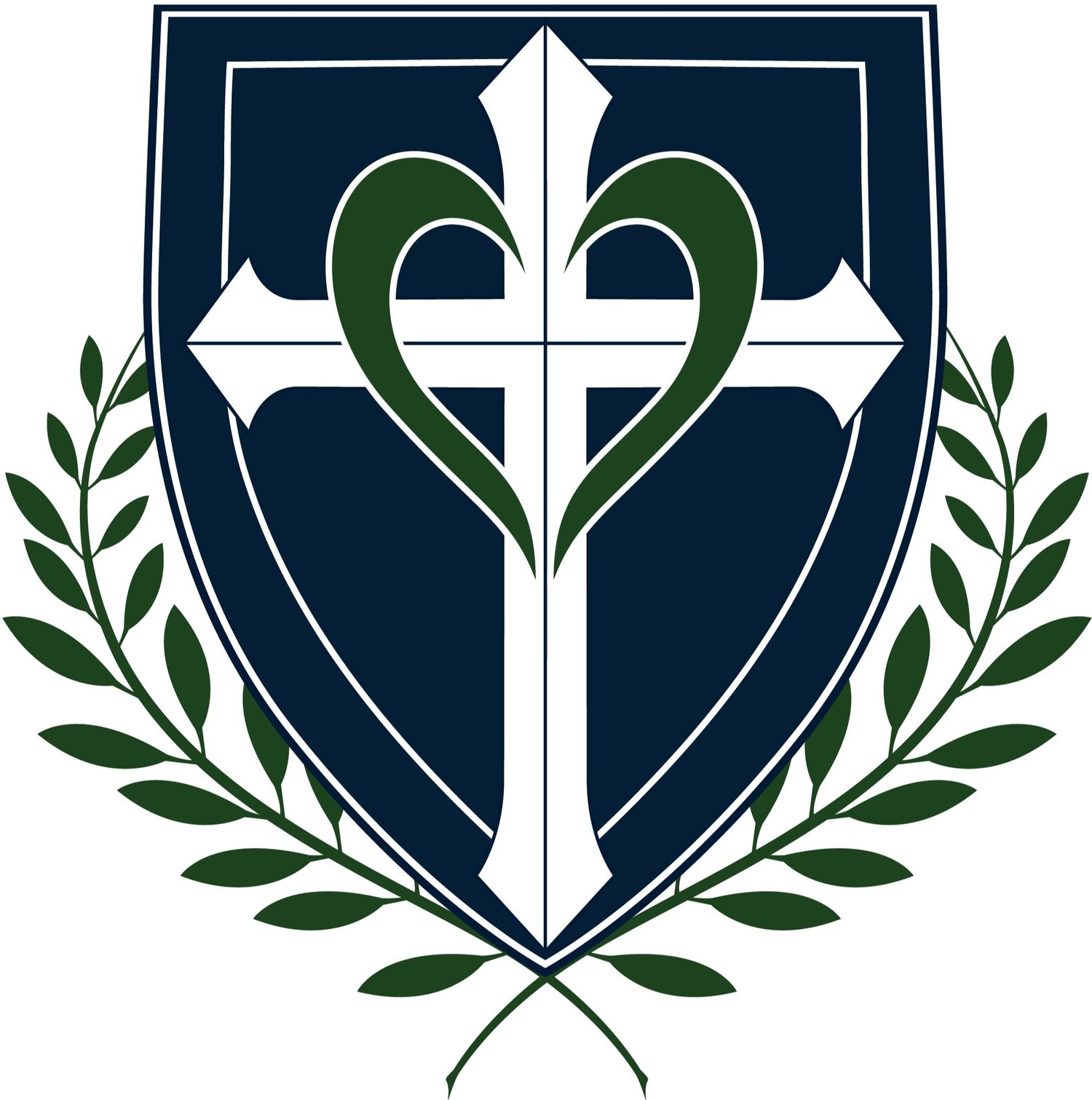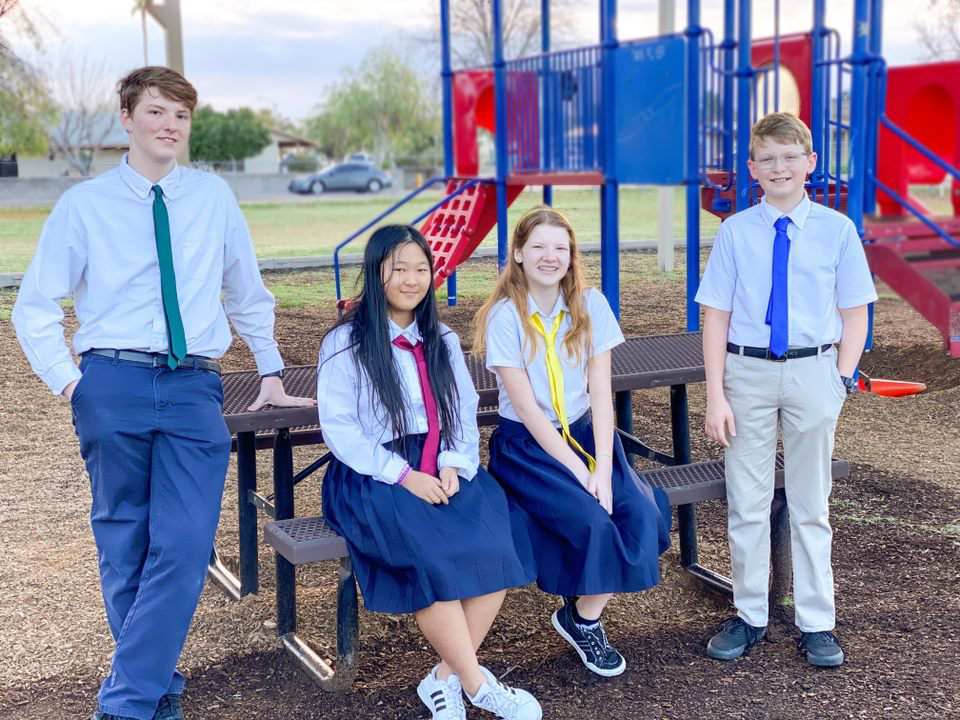Academics
Our academic program, based in the Christian classical method, develops students’ character, depth of intellect, reasoning, and speaking.
Hybrid Program (Kindergarten-6th Grade): We believe that God has given parents a command to educate their children (Deut. 11:9). A child’s education is not just accomplished in a classroom; parents pour knowledge into their children throughout the day. Many parents want to participate in a more formal way. In our Hybrid Program, an on-campus teacher provides students with classroom instruction three days per week and on the other two days, parents use the teacher’s specially crafted lesson plans to oversee independent practice at home. Our aim is to provide everything parents need in order to help them successfully facilitate Remote Learning Days with their student. By providing the framework for the Remote Learning Days, parents receive structure, accountability, and community as they fulfill God’s purpose. Students receive the benefit of a brick-and-mortar classroom experience coupled with the benefits of more time with their parents.
-
These “pre-grammar” years are focused on developing an excellent foundation in reading, writing, and math.
Our goal is to have students reading children’s classics and writing with confidence by 2nd grade. We use a phonics program and a grammar program that build these core skills at an advanced rate.
-
In 2nd through 4th grade, our students hone their core skills of reading, writing, and math while they learn Latin, science, literature, geography, and history.
Our goal during these years is to develop independent study skills and self-learning by the time the student begins the 5th grade. We deeply study specific areas of science and history since students in these years find a detailed depth of knowledge in an area more easily grasped and understood than high-level abstractions.
-2nd grade studies Old Testament ancient Mesopotamia and Egypt.
-3rd grade studies New Testament ancient Greece and Rome.
-4th grade studies Middle Ages, Renaissance, and Reformation.
-
Once students have developed an independence and love of learning, it’s time to immerse them further into the wonder of learning. During these years, students engage literature and history with a sense of excitement and personal understanding not often present in earlier years. They begin to understand the deeper and more complex way of enjoying literature and writing creatively.
Our goal during these years is to have students discover what more than 6,000 years of human history and literature, art and culture, science and theology can provide in the way of exploration.
Students learn about the Great Ideas that are inherently human, that transcend time. They are the lessons, or truths, within a story. They provide biblical worldview training and spiritual formation. They are used as the principal tool for subject integration. They are the common thread that weaves throughout our discussions in literature, history, and science.
Students perform a Shakespeare play, read mythological literature, perform multiple public performances, enjoy the art of the Renaissance, and begin to write creatively. Of course, Latin is present in both years.
-5th grade emphasizes The Age of Exploration to American Founding.
-6th grade studies United States from Founding to Present Day.
The Upper School utilizes a 5-day on-campus structure and is split into the School of Logic (7th-9th) and the School of Rhetoric (10th-12th). For the 2024-25 school year, Caritas Academy offers up to 10th grade and will be adding a grade each year.
School of Logic (7th - 9th Grade)
During the Logic school years, students and the methods of teaching build upon the foundation gained in Grammar School. Socratic teaching is implemented to a higher degree and Logic is introduced in a more formal way. Beginning the use of discussion and debate does not change the expectations of order, peace, courtesy, and enthusiasm of that in the Grammar School, but rather students are encouraged to challenge one another in a manner that utilizes these qualities.Our Letters track begins in the 7th grade as students immerse themselves into worldviews. History, literature, philosophy, theology, and art are taught as an integrated whole, with scripture as the revelation of God’s truth. These classes are taught almost entirely from original source documents, not textbooks. We teach students to develop their own understanding of history from those who lived at the time, rather than depending on the skew of a textbook. Students will be inducted into one of the four Houses (Tolkien, Lewis, Sayer, or Green House) wherein they will compete academically and athletically.
Students will grow in their ability to read, write, and speak Latin through the use Hans Orberg’s Lingua Latina and Thedore Beza’s Latin New Testament.
Students will learn Deductive Logic (categorical and propositional) and Inductive Logic (probabilistic reasoning).
Students will participate in Drama, Music, Visual art, Archery and Fencing.
-
The Bible
The Odyssey by Homer
The Aeneid by Vergil
Sir Gawain and the Green Knight
Song of Roland
Beowulf
Macbeth by Shakespeare
History of the Kings of Britain
Confessions by Augustine
The Early History of Rome by Livy
School of Rhetoric (10th - 12th Grade)
Modern educational methods tend to stay the same throughout a child's K-12 years — memorize some information then reproduce it to pass a test. Classical education changes to match your child's learning stage. In high school, students become concerned with what others think of them. This is a golden opportunity to infuse wisdom and eloquence. The rhetoric stage is where your child will begin to see his abilities as a leader and will be given more opportunities to mentor younger students or apply to be House leader. If he enjoys sports, we provide ample opportunity to grow as part of a team. All students are given various classroom responsibilities. We help students mature during these years – as responsibilities increase, freedoms and privileges also increase. These opportunities to mature as a Christian will benefit your child throughout life as he navigates relationships at college, at work, and within his own family and church.






